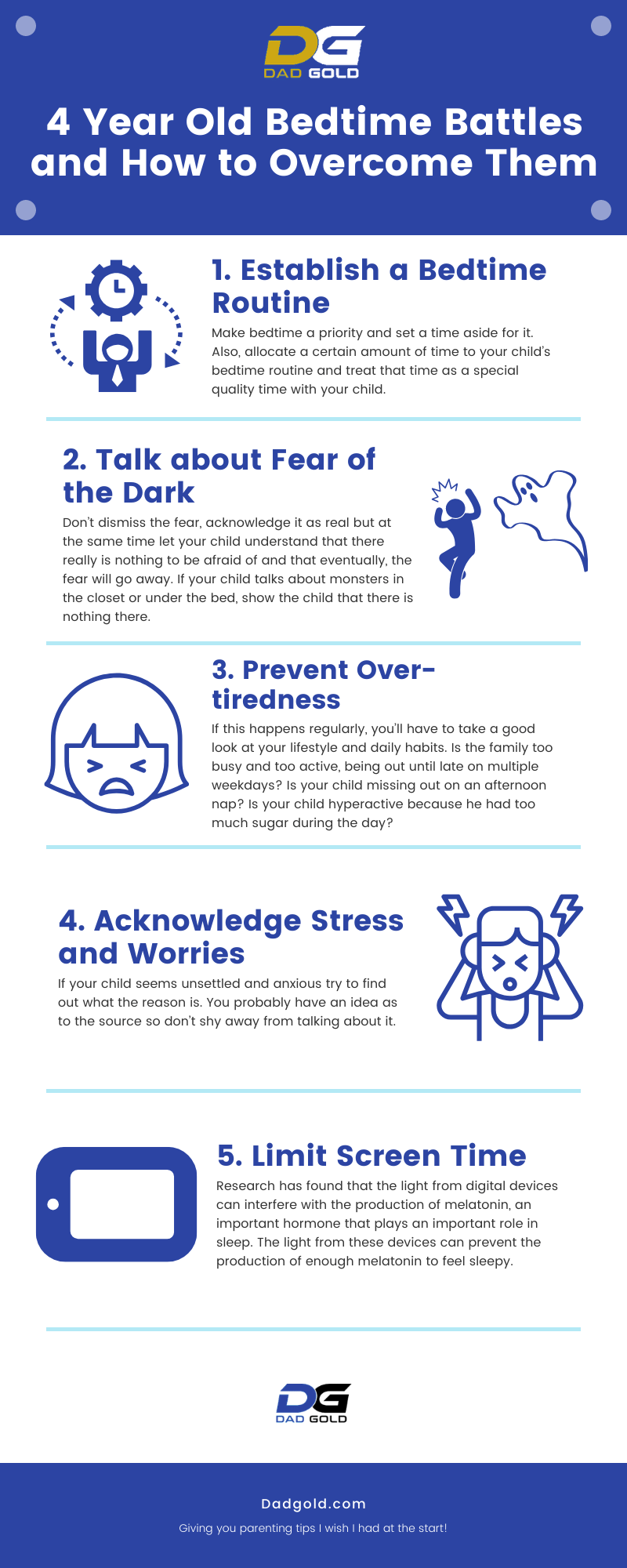I think you’ll agree with me when I say it can be tough to get a 4-year-old to bed at night! I’m sure you can relate to bedtime tantrums and endless stalling tactics to postpone bedtime as long as possible.
That may be the case in your household, but I tell you bedtime doesn’t have to be such a battle!
A child may refuse to go to bed for a variety of reasons, one of the most common being a fear of the dark.
Well, it turns out that you can follow strategies to overcome the most common reasons your child is resisting sleep or struggling to fall asleep.
What you will learn from this post:
- 5 reasons for 4-year-old bedtime battles
- 5 things you can do to help the 4-year-old bedtime battles

5 Common Reasons for 4 Year Old Bedtime Battles
There are many reasons why a 4-year-old may refuse to go to bed.
The child may be afraid of the dark, which is very common. Another common reason for bedtime battles is a total absence of a bedtime routine.
An overtired child will rub his eyes, fidget and cry but won’t concede that he’s tired. Then again, a child experiencing stress at home or kindergarten may not be able to settle down at bedtime.
And, of course, we have our modern-day malaise that is notorious for preventing a good night’s sleep: too much screen time.
Let’s take a look at the 5 most common 4-year-old bedtime battles.
1. No Bedtime Routine
You know the drill: you are tired from a long day, but he’s running around like a cat on a hot tin roof. He’s jumping on the couch and screaming blue murder at the top of his voice.
The moment he’s watching something on TV, and the next he’s emptying your laptop bag. He refuses to sit down and eat his dinner. It’s chaos, and your reminder that ‘it’s bedtime’ falls on deaf ears.
The obvious solution is to create a bedtime routine. It’s not so difficult as you might think, as you will see later in the post. All that’s needed is some real commitment from you.
2. Fear of the dark
Fear of the dark is a common reason for little ones not being willing to stay in bed after you’ve put them down in the evening. Not surprising. Think back. Were you not afraid of what or who might be hiding in the closet or under your bed?
Most toddlers have a vivid imagination, and when you turn off the light, they can become so fearful that they refuse to stay alone in their room. That’s completely understandable. The critical thing to remember is that fear is genuine for your child.
Whatever you do, don’t dismiss your child fear of the dark!
3. Your Child Is Overtired
When a child starts rubbing her ears, can’t stop fidgeting, and cries for no reason, you know she is overtired. It is way past her bedtime; she desperately needs to sleep but can’t go to sleep.
Overtiredness often happens when the child has been overstimulated – too many people, too much going on. So what’s needed is some time to calm things down.
4. Stress and Worries
Don’t underestimate a child’s stress levels. Children are susceptible to the atmosphere in the home – they know if mommy and daddy are not talking again.
All manner of things could be playing on their minds and prevent them from relaxing and falling asleep. Maybe the family moved recently; a new baby has arrived, someone got badly hurt or is very sick, a friend has been horrible to them, mommy is very angry with me.
And so, the possible list of stressors goes on.
5. Too Much Screen Time
Research worldwide has linked sleep problems with too much digital screen use. This is true for kids as well as adults. For example, watching TV before bed or using a tablet or a smartphone is not compatible with a good night’s rest.
Young children who are left to watch loads of TV tend not to sleep long enough to rest appropriately. Instead, they often wake up tired because of poor quality sleep.
5 Ways You Can Overcome 4-Year-Old Bedtime Battles
There is a solution for each of the above scenarios, which I’m sure you’re only too familiar with. You may be at the end of your wits, but hold on, you can turn bedtime battles into world peace.
First of all, it helps to be firm and resolute that you expect your child to go to bed and sleep. Children are brilliant; if they sense that you are not resolute, they will take advantage of your doubt, indecision, or whatever you want to call it, and you will have an ongoing battle on your hands.
Let’s have a look at how we can fix 4-year-old bedtime battles!

1. Establish a Bedtime Routine
Make bedtime a priority and set time aside for it. Also, allocate a certain amount of time to your child’s bedtime routine and treat that time as a special quality time with your child.
The nature of the routine is that it consists of the same activities simultaneously. That makes the routine predictable, which is reassuring for a small child. For example, a predictable, calming bedtime routine involving activities like a bath, brushing teeth, finding favorite soft toys, and story time will do wonders to calm your child down.
Why? Because they sense that they have your undivided attention and that is actually all they really want.
Listening to someone reading to you or telling a story is relaxing and calming. There is nothing nicer than falling asleep to the voice of someone you love. Do this for your child, and you’ll be building an extraordinary relationship.
2. Talk about Fear of the Dark
Please don’t dismiss the fear; acknowledge it as real but at the same time, let your child understand that there is nothing to be afraid of and that eventually, the fear will go away. If your child talks about monsters in the closet or under the bed, show the child that nothing is there.
Turn off the light and leave a night light on for your child. You might also want to consider a night light projector with soothing music. Dim light is calming. Again, a story might help here – your child might fall asleep while you’re reading, so the whole issue with monsters in the dark will automatically be resolved.
3. Prevent Over-tiredness
If this happens regularly, you’ll have to look at your lifestyle and daily habits. Is the family too busy and active, being out until late on multiple weekdays? Is your child missing out on an afternoon nap? Is your child hyperactive because he had too much sugar during the day?
All these factors can contribute to an overtired child that struggles to settle down.
Avoiding staying out too late and having too many activities with no rest in between will go a long way to preventing a small child from getting overtired.
Again, if you have a calming bedtime routine in place, your child will start calming down as soon as she realizes that the usual things happen before she goes to sleep. You can help your child calm down by staying calm and just following the same soothing bedtime routine.
4. Acknowledge Stress and Worries
If your child seems unsettled and anxious, try to find out why. You probably have an idea about the source, so don’t shy away from talking about it.
Experts advise that if something serious happened, it’s advisable to keep to the usual bedtime routine as this makes a small child feel safe and in control.
It’s vital to acknowledge your child’s feelings and that you let your child know you understand. But don’t go on and on about it. You want your child to realize that life goes on and everything will be okay.
You want to avoid your child going to sleep in fear, so you need to be very loving and reassuring. That means lots of hugs and kisses.
5. Limit Screen Time
Research has found that the light from digital devices can interfere with the production of melatonin, an important hormone that plays an essential role in sleep. The light from these devices can prevent the production of enough melatonin from feeling sleepy.
Watching TV or using other digital devices like smartphones and tablets before bed can keep a child awake for hours.
Don’t let your children watch TV after dinner and put your phone out of the way. At bedtime, read stories from a book, not a tablet or a phone.
Frequently Asked Questions

How long do the 4-year-old bedtime battles last?
That depends on how you deal with them! By following the 5 tips on this page, they will be over in no time. If you allow it to continue, it could go on for years.
Why does my 4-year-old fight sleep?
Because this is the time in life when they want to make their own decisions, and your 4-year-old is putting their foot down! These 4-year-old bedtime battles need to be fought and won by us!
What do you do when your 4-year-old doesn’t sleep?
If our 4 year old will not sleep, you need to figure out why. There are 5 tips for overcoming the 4-year-old bedtime battles on this page, so use them to make life a little easier.
Conclusion
There are many legitimate reasons why a 4-year-old might have trouble sleeping at bedtime. But bedtime doesn’t have to be a nightly battle between parent and child. Instead, these 4-year-old bedtime battles can be bought to an end!
Show your child that you mean it, that you are serious about their bedtime. Slow things down at the end of the day with a simple bedtime routine that’s enjoyable for you and your child.
You can use this time as a time for you to slow down as well and leave the world and its issues outside for an hour or so.
Remember, what most children crave most is their parents’ undivided attention. Give it to them for a while every night, and you’ll have children that go to bed happily.
Good luck!






